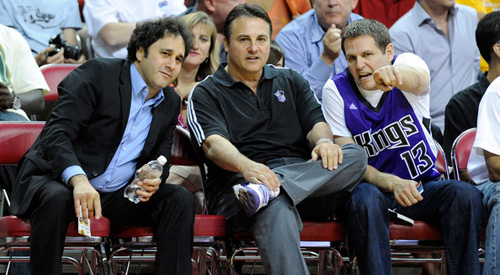
Further Notes on Sacramento and Seattle
Things aren’t going well for the Sacramento Kings. At 19-41, they’re in the NBA’s cellar and have some of the worst team statistics in the league: the worst SRS in their conference, the most points allowed per game.
One thing they do have is potential. All of their best players are young, with Jason Thompson the oldest at 25. At the other end of that spectrum, guard Isaiah Thomas is a dark horse for rookie of the year: he’s averaging 16 points and six assists per 36 plus a PER of 17.5 and 3.6 Win Shares. He scores more than Ricky Rubio, assists like Kemba Walker and compares pretty favorably to Kyrie Irving.
One thing the Sacramento Kings don’t seem to have is a future. At least as the Sacramento Kings, anyway.
The Maloof brothers, owners of the Kings, and the city of Sacramento are at an impasse over a new arena. On Friday, NBA Commissioner David Stern called the deal dead. How did we get here so quickly? Didn’t they just come to an agreement? Let’s move backward for a second.
Earlier this year, the NBA set a March 1 deadline for Sacramento to show a funding plan for a new arena. The city met that deadline with a plan: it would mostly come from the city, with funds raised through a parking program that could reach as much as $230 million.
That was at the beginning of March. On Sunday, the Maloofs backtracked, pulling out of the deal. The official reason has something to do with a list of demandsthat leaked out over the weekend, which basically summarize like this: Kings management doesn’t want to pay to build the arena, pay to rent the arena and doesn’t want to sign a 30-year lease to stay in the arena.
[php snippet=1]
Another way to look at their demands is to see the team demanding what they know they won’t get, so they can claim they tried to find a local solution as they load the Mayflower trucks. Kind of like how Clay Bennett tried to find a new arena in the Seattle area before deciding to move to Oklahoma.
With the arena deal dead, the Kings’ future is up in the air. They’re presumably locked into the Power Balance Pavilion for next season, but after that, who knows?
Most speculation has the Maloofs moving the Kings to Anaheim. It’s where they almost went last year, to the NBA-Ready Honda Center. It currently seats 18,336 for basketball (over 1,000 more than the Power Balance Pavilion) and is an occasional home for NCAA basketball. It’s not the first time a team has dabbled with moving to Anaheim. In 1996, the Clippers nearly moved there, but decided to stay at the LA Sports Arena.
Could the Clippers keep another team from moving there? With two NBA teams, Los Angeles is already a crowded basketball market; can it handle a third team? The rise of the Clippers to prominence this season is a major difference from last year’s near-move: at best, the Kings would be second fiddle to the Lakers, but unless they improve fast, they’ll be hard-pressed to compete with two teams.
Another option is moving cross-country – back to where they originally came from – to Kansas City’s NBA-ready stadium: the 19,000 seat Sprint Center. Right now it’s the home to concerts and occasional college hockey and pro wrestling events, but not to any major pro teams, not even on the minor level (unless one counts the AFL’s Kansas City Command, a team with a B-2 Stealth bomber for a logo – I don’t).
There’s also the option almost nobody is mentioning: what if the Maloofs sell the Kings? They have hefty debts: $77 million to the city of Sacramento and at least $75 million to the NBA. This comes after their shares in the Palms Casino dropped to just two percent. One potential buyer would be Christopher Hansen up in Seattle.
His name has come up in the Kings future before, thanks to a proposed new arena in Seattle. And he’s serious about it too: only a few days ago, he bought land by Safeco Field. It’s a good spot for an arena and, well, the New Orleans Hornets aren’t for sale anymore.
Losing the Kings would be a shame for the NBA. When the Kings were good; when they played in possibly the greatest playoff series of all time a decade ago, they had some of the league’s best – and loudest – fans. This wouldn’t be a case of an apathetic fanbase rejecting a team: even as one of the league’s worst teams, with constant drama around their future, the Kings still draw a crowd. They’ve drawn more than safe franchises like Detroit, Indiana and the playoff-bound Atlanta Hawks.
Like what happened with the Sonics, the Kings departure from their city is just business, nothing personal. After all, the Maloofs tried to meet them halfway: just read their list of demands.
[php snippet=1]

